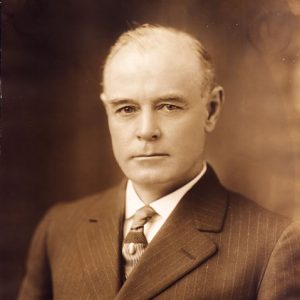calsfoundation@cals.org
Albert Homer Purdue (1861–1917)
Albert Homer Purdue was the ex officio state geologist from 1907 to 1912. He published many works on the geology of both Arkansas and Tennessee. Purdue was a renowned geologist and taught at Arkansas Industrial University, which is now the University of Arkansas (UA) in Fayetteville.
Albert Purdue was born on March 29, 1861, on a farm near Yankeetown, Indiana, to Samuel Leroy and Phoebe (Priest) Purdue. Albert was the second oldest of eight children and spent his youth working on the family farm, receiving only minimal formal education. At the age of twenty, however, he entered the Indiana State Normal School (later Indiana State University) in Terre Haute. He received his diploma on June 8, 1888. Until 1896, Purdue was an itinerant scholar serving as a teacher or superintendent in various school systems in Indiana, Missouri, and finally New Mexico while he pursued higher education. In 1887, Purdue married Bertha Lee Burdick, but she died a year later of tuberculosis.
He attended Purdue University in West Lafayette, Indiana, but obtained his BA on May 31, 1893, as the first geology student graduated by Stanford University in California. While at Stanford, Purdue worked under Professor John Casper Branner, who was state geologist of Arkansas from 1887 to 1893. He also operated a laundry business with fellow geology student Herbert Clark Hoover, who later became president of the United States. Purdue left Stanford in 1894 to run as a Republican for state geologist of Indiana but was defeated. He served as principal of Rensselaer High School in Indiana during the 1894–95 school year. The following academic year, he enrolled as a graduate student in geology on a fellowship at the University of Chicago. He later left, as he was given a position as professor of geology at Arkansas Industrial University.
In 1896, Purdue was made associate professor of geology with the responsibilities of curating the university museum collections as well as teaching the entire geology curriculum. He was promoted to full professor in 1898 and married Ida Pace, an associate professor of English at the university, on December 22. They had two sons.
By legislative act, Purdue was appointed ex officio state geologist of Arkansas from 1907 to 1912, in addition to his responsibilities for teaching and research at the university. As state geologist, he oversaw publication of volumes on slates for 1909 (which he authored), coal mining for 1910 (by A. A. Steel), and water power for 1911 (by W. N. Gladson). He was also a field geologist for the U.S. Geological Survey during the summers of 1895 and 1900 through 1912. Folios published as a result of this field work depicting the geology of areas in the Ozarks, Hot Springs (Garland County), and southern Arkansas furthered Purdue’s reputation as a geologist. In 1912, the state cut off support for his position, and in February 1912, Purdue was granted leave to accept the position of state geologist of Tennessee. He officially resigned his university position that summer. He was presented with a silver cup by his students, and the university awarded him an honorary LLD degree.
While state geologist of Tennessee, Purdue produced a series of volumes on the resources of the state, especially its base metals. At that point in his life, he was a member of the American Institute of Mining Engineers, the Geological Society of America, and the Geological Society of London, as well as president of the Tennessee Academy of Sciences.
An intestinal condition that had plagued him for nearly thirty years became increasingly acute in the latter stages of his life. A series of attacks left him periodically incapacitated, and a particularly severe attack in November 1917 while he was working in the field forced him to return to Nashville, Tennessee, for surgery. On the morning of the operation, he dictated a report on the manganese deposits he had been investigating in eastern Tennessee. Although the operation was at first deemed successful, complications set in, and Purdue died of uremic poisoning (kidney failure) on December 12, 1917.
For additional information:
Albert Homer Purdue Papers. Special Collections. University of Arkansas Libraries, Fayetteville, Arkansas.
John Casper Branner Papers. Special Collections. University of Arkansas Libraries, Fayetteville, Arkansas.
Walter L. Manger
University of Arkansas, Fayetteville
Staff of the CALS Encyclopedia of Arkansas





Comments
No comments on this entry yet.